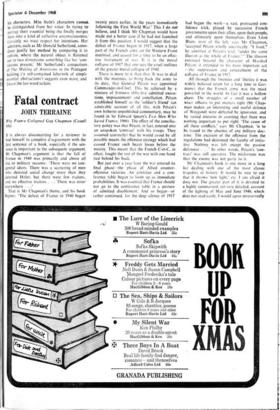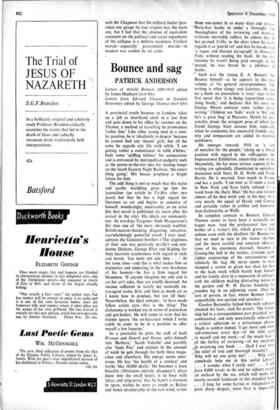Fatal contract
JOHN TERRAINE
Why France Collapsed Guy Chapman (Cassell 63s) It is always disconcerting for a reviewer to find himself in complete disagreement with the first sentence of a book, especially if the sen- tence is important to the subsequent argument. Mr Chapman's argument is that the fall of France in 1940 was primarily and above all due to military reasons: 'There were no con- genital idiots. There was a scattering of men who detested social change more than they detested Hitler, but there were few traitors, and no effective traitors . . . There was error everywhere . .
That is Mr Chapman's theme, and his book begins: 'The defeat of France in 1940 began
twenty years earlier, in the years immediately following the First World War.' This I do not believe, and I think Mr Chapman would have made out a better case if he had not launched it from this position. I would suggest that the defeat of France began in 1917, when a large part of the French army on the Western Front mutinied, and ceased for a time to be an effec- tive instrument of war. It is in the moral collapse of 1917 that one sees the cruel outlines of the greater moral collapse of 1940.
There is more to it than that. It was to deal with the mutinies, to brine back the army to its duty, that General Pet:tin was appointed Commander-in-Chief. This he achieved by a mixture of firmness tfifty-five admitted execu- tions, imprisonment) and conciliation. Petain established himself as the 'soldier's friend' (an admirable account of all this, with Main's own hitherto unpublished commentary, may be found in Sir Edward Spears's Two Men Who Saved France, 1966). The effect of the concilia- tory policy-was that Petain, in fact, entered into an unspoken 'contract' with his troops. They assumed (correctly) that he would avoid by all possible means the offensive strategy which had caused France such heavy losses before the mutiny. This meant that- the French C-in-C, in effect, fought the rest of the war with one hand tied behind his back.
But just over a year later the war entered its final phase—the phase of Allied counter- offensive victories. An armistice and a con- ference table began to loom up as immediate probabilities. It was essential that France should not go to the conference table in a posture of admitted disablement. And so began—or rather continued, for the deep silence of 1917 had begun the work—a vast, protracted con- fidence trick, played by successive French governments upon their allies, upon their people, and ultimately upon themselves. Even Lion Blum. man of the left, says Mr Chapman. 'accepted Petain wholly uncritically. "I lived," he admitted at PCtain's trial, "under the same illusion as the whole of France."' The illusion extended beyond the character of Marshal Petain: it extended to his most important act —the suppression and concealment of the collapse of France in 1917.
MI through the 'twenties and 'thirties it was widely believed (even for a long time in Ger- many) that the French army was the most powerful in the world. In fact it was a hollow sham. The struggles of a small number of wiser officers to put matters right (Mr Chap-, man makes an Interesting and useful defence of Weygand) were defeated by ignorance, and by vested interests in asserting that there was
nothing important to put right. The cause of all these conflicts,' says Mr Chapman. 'is to be traced to the absence of any military doe-. trine. The excision of the offensive from the regulations had destroyed the faculty of live. Nothing was left except the passive
defensive . . In other words, Petain's 'con- tract' was still operative. The misfortune was that the enemy was not party to it.
Mr Chapman's book is one more in a long list dealing with one of the most classic tragedies of history. It would be nice to say.
that it throws 'new light,' etc. I am afraid it does not. The greater part of it is devoted to a highly summarised, yet very detailed, account of the fighting of. May and June 1940, which. does not read easily. I would agree unreservedly with Mr Chapman that the military factor (pro- vided one grasps its true origins) was the main one, but I feel that the absence of equivalent comment on the political and social ingredients of the collapse is a definite weakness. Civilian morale—especially government morale—in modern war cannot be set aside.



































 Previous page
Previous page